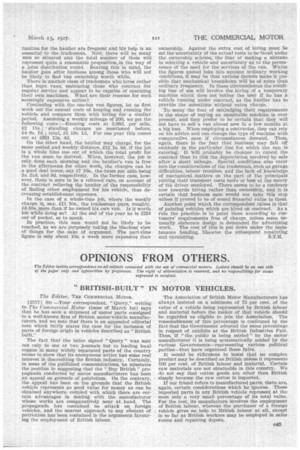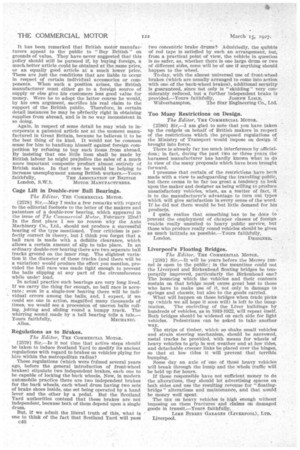OPINIONS FROM OTHERS.
Page 67

Page 68

If you've noticed an error in this article please click here to report it so we can fix it.
The Editor invites correspondence on all subjects connected with the use of commercial motors; Letters should be on one side of the Paper only and typewritten by preference, The right of abbreviation is reserved, and no responsibility for views expressed is accepted,
" BRITISH-BUILT " IN MOTOR VEHICLES.
The Editor, THE COMMERCIAL MOTOR.
T2577] Sir —Your correspondent, "Query," writing to The Commercial Motor (issue of March 1st) says that he has seen a shipment of motor parts consigned to a well-known firm of British motor-vehicle manufacturers, and we note that there is an appended editorial note which fairly states the case for the inclusion of parts of foreio origin in vehicles described as "British built."
The fact that the letter signed " Query " was sent not only to one or two journals but to leading local organs in many widely separated parts of the country seems to show that its anonymous writer has some real interest in discrediting the British industry. Certainly, in some of the published communications, he misstates the position in suggesting that the "Buy British" propaganda conducted by motor manufacturers has been An appeal on grounds of patriotism. On the contrary, the appeal has been on the grounds that the British vehicle represents as good value for money as can be obtained anywhere, coupled with which there are certain advantages in dealing with the manufacturer whose works are comparatively near at hand. The propaganda has contained no attack on foreign vehicles, and the nearest approach to any element of patriotism has been contained in the arguments favouring the employment of British labour, The Association of British Motor Manufacturers has always insisted on a minimum of 75 per cent, of the value of a vehicle being represented by British labour and material before the maker of that vehicle should be regarded as eligible to join the Association. The reasonableness of this percentage is confirmed by the fact that the Government adopted the same percentage in respect of exhibits at the British Industries Pair. Thus, if "the public is being misled" by the motor manufacturer it is being systematically misled by the various Governments—representing various political parties—that have organized these fairs.
It would be ridiculous to insist that no complex product may be described as British unless it represents 100 per cent. of British labour and material. Certain raw materials are not obtainable in this country. We do not say that cotton goods are other than British simply because the raw cotton is imported.
If our friend refers to manufactured parts, there are, again, certain considerations which he ignores. These imported parts in any British vehicle represent at the most only a very small percentage of its total value. For the rest, its manufacture involves•the employment of British labour, whereas the purchaser of a foreign vehicle gives no help to British -labour at all, except in so far as British workers may be employed in sales rooms and repairing depots. It has been remarked that British motor manufacturers appeal to the public to " Buy British" on grounds of value. They have never suggested that this policy should still be pursued if, by buying foreign, a much better article could be obtained at the same price, or an equally good article at a much lower price. These are just the conditions that are liable to occur in respect of certain individual accessories or components. When such a position arises, the British manufacturer must either go to a foreign source of supply or else give his customers less good value for money. Were he to adopt the latter course he would, by his own argument, sacrifice his real claim to the support of the British public. Therefore, in certain detail instances he may be Orfectly right in obtaining supplies from abroad, and is in no way inconsistent in so doing.
Again, in respect of sonic detail he may wish to incorporate a patented article not at the moment manufactured in Great Britain, because he believes it to be the best thing of its kind. It would not be common sense for him to handicap himself against foreign competition by refusing to buy such items from abroad. By insisting that one little item shall be made by British labour he might prejudice the sales of a much more important composite product almost entirely of British make, In that ease he would be helping to increase unemployment among British workers.—Yours faithfully, THE ASSOCIATION OF BRITISH London, S.W.1: MOTOR MANUFACTURERS.
Cage Lift in Double-row Ball Bearings. The Editor, THE COMMERCIAL Moron.
12578j Sir,—May I make a few remarks with regard to the editorial footnote to the letter of the makers and patentees of a double-row bearing, which appeared in he issue of The Commercial Motor, February 22nd? In the first place I see no reason why the Auto Machinery Co., Ltd., should not produce a successful bearing of the type mentioned. Your criticism is perfectly correct in theory, but I think you forget that a ball race is made with a definite clearance, which allows a certain amount of slip to take place. In an ordinary double-row bearing there are two separate ball tracks ground on the inner ring. The slightest variation in the diameter of these tracks (and there will be a variation) would produce the effect you mention, provided the ball race was made tight enough to prevent the balls slipping at any part of the circumference while uncle*: load.
In actual practice such bearings are very long lived. If we carry the thing far enough, no ball race is accurate; even in a single-row bearing there will be individual errors among the balls, and, I expect, if we could see one in action, magnified many thousands of times, we would see a procession of uneven balls rolling, jolting and sliding round a bumpy track. The whirring sound made by a ball bearing tells a tale.—
Yours faithfully, MECHANIC. Alloa.
Regulations as to Brakes.
The Editor, THE COMMERCIAL MOTOR.
[2579] Sir,—Is it not time that active steps should be taken to induce Scotland Yard to modify its ancient regulations with regard to brakes on vehicles plying for hire Within the metropolitan radius?
These regulations (which were filmed several years • ago, before the general introduction of front-wheel brakes) stipulate two independent brakes, each one to be capable of locking the back wheels. Now, in modern automobile practice there are two independent brakes for the back wheels, each wheel drum having two sets of brake shoes inside, one set being operated by a hand lever and the other by a pedal. But the Scotland Yard authorities contend that these brakes are not independent, because both of them depend upon a single drum.
But, if we admit the literal truth of this, what is one to think of the fact that Scotland Yard will pass c46 two concentric brake drums? Admittedly, the quibble of red tape is satisfied by such an arrangement, but, from a practical point of view, the vehicle in question is no safer, as, whether there is one large drum or two of different sibs, none will be of use if anything should happen to the wheel.
To-day, with the almost universal use of front-wheel brakes (which are usually arranged to come into action with one of the back-wheel brakes), additional security is guaranteed, since not only is "skidding" very considerably reduced, but a further independent brake is provided.—Yours faithfully, .TosEPia LISLE, Wolverhampton. The Star Engineering Co., Ltd.
Too Many Restrictions on Design. •
The Editor, THE COMMERCIAL MOTOR.
[2580] Sir,—I am glad to note that you have taken up the cudgels on behalf of British makers in respect of the restrictions which the proposed regulations of the Ministry of Transport would impose on design if brought into force.
There is already far too much interference by officialdom; in fact, during the past two or three years the harassed manufacturer has hardly known what to do hi view of the many proposaLs which have been brought forward.
I 'presume that certain of the restrictions have been made with a view to safeguarding the travelling public, but there seems to be far too great a tendency to look upon the maker and designer as being willing to produce unsatisfactory vehicles, when, as a matter of fact, it is to the manufacturer's advantage to turn out types which will give satisfaction in every sense of the word. If he did not there would he but little demand for his products.
I quite realize that something has to be done -to . prevent the employment of cheaper classes of foreign vehicle really unsuited to heavy public serviee, but those who produce really sound vehicles should be given as much latitude as possible.—Yours faithfully, London. • DESIGNER,
Liverpool's Floating Bridges.
The Editor, THE COMMERCIAL MOTOR.
[2581] Sir—It will be years before the Mersey tunnel is open to the public ; In the meantime could not the Liverpool and Birkenhead floating bridges be temporarily improved, particularly the Birkenhead one? The bouncing which the vehicles and their contents sustain on that bridge must cause great loss to those who have to make use of it, not only in damage to springs and chassis, but also to the goods carried.
What will happen on those bridges when trade picks up (which we all hope it soon will) is left to the imag ination. The encircling of the Liver buildings by hundreds of vehicles, as in 1910-1922, will repeat itself. Both bridges should be widened on each side for light vehicles. Pedestrians can be asked to take another way.
The strips of timber, which so shake small vehicles and strain steering mechanism, should be narrowed, metal tracks be provided, with means for wheels of heavy vehicles to grip in wet weather and at low tides, and detachable creeper links be placed over the hinges, so that at low tides it will prevent that terrible bumping.
Some day an axle of one of thosO heavy vehicles will break through the bump and the whole traffic will be held up for hours.
If those responsible have not sufficient money to do the alterations, they .should let advertising spaces on both sides and use the resulting revenue for " floatingbridge " alterations and maintenance, and that wouldbe money well spent.
The tax on heavy vehicles is high enough without imposing on them fractures and claims on damaged goods in transit. —Yours faithfully, LIME STREET GARAGES (LIVER2001.), LTD. Liverpool.












































































































